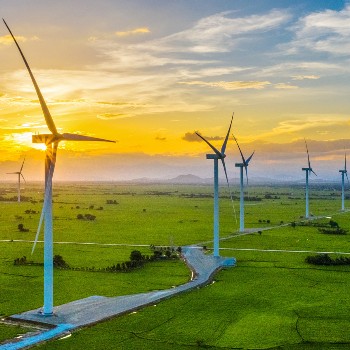Energy & Climate
Subscribe to our newsletter to get the latest updates in the EU energy space!
Europe’s energy sector is in the midst of a transformation – we support companies as they navigate this rapidly changing market and policy environment
With sustainability as the top priority for European policymakers, the energy system must manage competing pressures now more than ever.
Europe’s energy policy has rapidly evolved over the past two decades. The creation and strengthening of Europe’s internal energy market has given way to a relentless focus on decarbonisation. With the European Green Deal, the European Commission has committed to reinforcing existing policies on renewable energy and energy efficiency, while pushing forward in new areas such as sector integration and external carbon pricing.
The energy sector accounts for 29% of Europe’s emissions, and fossil generation remains a major contribution to air pollution in some European regions. At the same time, the rapid growth of renewables, reaching a 38% share of electricity production in 2020, has caused knock on effects for system management.
The Clean Energy Package was the major legislative initiative launched to tackle this by the Juncker Commission and concluded over the course of 2018 and 2019. Comprising legislation on electricity markets, renewable energy, energy efficiency (with specific measures for buildings) and Governance of the Energy Union, the Package set the framework for Europe’s 2030 energy ambitions. Underpinning the package was a commitment to achieving a 32% share of renewable energy and 32.5% target for energy efficiency.
While ambitious, it is clear that more action is needed if Europe is to support the Paris Agreement to keep global temperature increases well below 2°C. President von der Leyen was quick to commit her mandate to raising the ambition of the 2030 framework, and augmenting it with new actions to speed up the transition to a zero carbon energy sector.
In April 2021, agreement was reached on the European Climate Law to this regard, enshrining climate neutrality by 2050 into law. The EU’s intermediary target for 2030 was also revised, raising ambition to reducing emissions by 55%.
To meet the 2030 target, the Commission is launching the Fit for 55 package in the summer of 2021, including revisions of most major pieces of energy legislation to align them with the increase in ambition.
One of the major issues will be carbon pricing, the Commission will propose to reinforce and expand the European Emissions Trading System growing to encompass new sectors of the economy like maritime transport and designing an adjacent system for buildings and road transport. Furthermore, a proposal for a Carbon Border Adjustment Mechanism will be published, seeking to level the playing field with competition from third countries with less stringent climate policies. Finally, an upcoming proposal to revise the Energy Taxation Directive will seek to more closely link the taxation of fuels to their carbon content.
All these carbon pricing tools are aimed at the decarbonization of different economic sectors, and will be complemented with measures to increase energy efficiency and the share of renewable energy. In this respect, the EU will revise the Energy Efficiency Directive and the Renewable Energy Directive, updating the targets that need to be met to stay on the right track for 2030.
Moreover, the energy sector will be impacted by a focus on Smart Sector Integration. Sector integration will lead to closer linkages between our divided energy system, driving efficiency, sustainability and flexibility. It will also shape the way our energy markets function and interact. In July 2020, the EU Commission published the EU Strategy for energy system integration. This strategy focuses on measures to ensure a circular energy system, where waste heat and energy are captured and reused.
In this context, hydrogen is considered a key tool for supporting sector integration and the broader decarbonisation agenda. It is hoped that clean hydrogen, produced from renewable electricity or a combination of natural gas reforming and Carbon Capture, Utilisation and Storage (CCUS), will play a core role in reducing emissions for the industrial and mobility sectors especially. To speed up progress on developing the hydrogen economy, the European Commission has also launched the Clean Hydrogen Alliance, as part of the Hydrogen Strategy, bringing together public and private sector institutions to kick start the entire value chain.
Biogas, and bioenergy more generally, will also be in focus. The recently launched Farm to Fork Strategy notes that biogas can be produced from agricultural waste, offering a nascent source of renewable fuels. Nevertheless, discussion continues on which transport modes should profit from these synthetic fuels.
Finally, the strengthening of Europe’s energy infrastructure will continue to be a key focus. The ongoing revision of the TEN-E Regulation will be used to rapidly develop the infrastructure needed for a clean energy system. With its decision to stop funding unabated fossil fuel projects, the European Investment Bank has demonstrated that any new infrastructure in Europe will need to be compliant with climate goals. This, alongside the Sustainable Finance agenda and shifting investor appetite, will impact the development of the internal energy market at a time when transporting clean energy across the continent is more important than ever.
These are just some of the topics impacting Europe’s energy system right now. The legislative agenda is developing extremely rapidly, as energy operators race to keep up with the EU’s decarbonisation objectives.
Energy expertise with a track record of delivering
FleishmanHillard’s EU energy team has been at the forefront of the energy policy agenda throughout the development of the current framework.
We have supported clients from across the energy sector, including renewables producers, TSOs, institutional investors and traditional energy operators.
Drawing on our wide base of experience, we help clients navigate this shifting landscape with 360° coverage of the issues impacting them. Our expertise is not only in the evolving policy environment, but also in helping our clients communicate effectively on complex and technical topics.
Our services
We provide wholesale advocacy and communications solutions for engagement on EU building and construction policy:
- Holistic political counsel on EU energy policy
With our expertise across EU policy areas impacting the energy sector, we help you think holistically about the developing political context for the sector.
The energy sector has never been more interconnected, with organisations impacted by an increasingly diverse policy framework. Assessing the landscape comprehensively, advising on prioritization and constantly monitoring the shifting environment are all fundamental to our activities. We strive to combine technical understanding and high-level strategy to map and identify the risks and opportunities for our clients.
- Communications that show how you add value to the energy transition
The energy sector is enormously complex from a technical, regulatory and political perspective. Energy operators can find it challenging to match their communications to audiences who are not experts, and get noticed at a time when there is so much noise.
The experts at FleishmanHillard Brussels help you tell a compelling story about your role in a sustainable energy system, and how you can help Europe achieve its climate and energy objectives.
We help you to create the right types of content, select the channels to reach your target audience and evaluate of the impacts of communications programmes with comprehensive measurement.
- Public affairs engagement with politicians and regulators
We are proud of our record successfully supporting the advocacy needs of our clients, be it in the area of energy, chemicals, finance or others.
Our role is straightforward: To help you understand your political audiences and present your best case.
We also support you in selecting effective engagement tactics and ensure the successful roll-out of your advocacy plan through every step of the EU’s decision making processes.
Energy & Climate News & Opinions
-
Bidding farewell to fossil fuels at COP28: How to get it right this time
November 27, 2023
-
Wind of change
July 13, 2023
-
The challenges for the EU’s Green Industrial Policy
May 10, 2023















